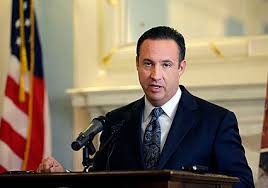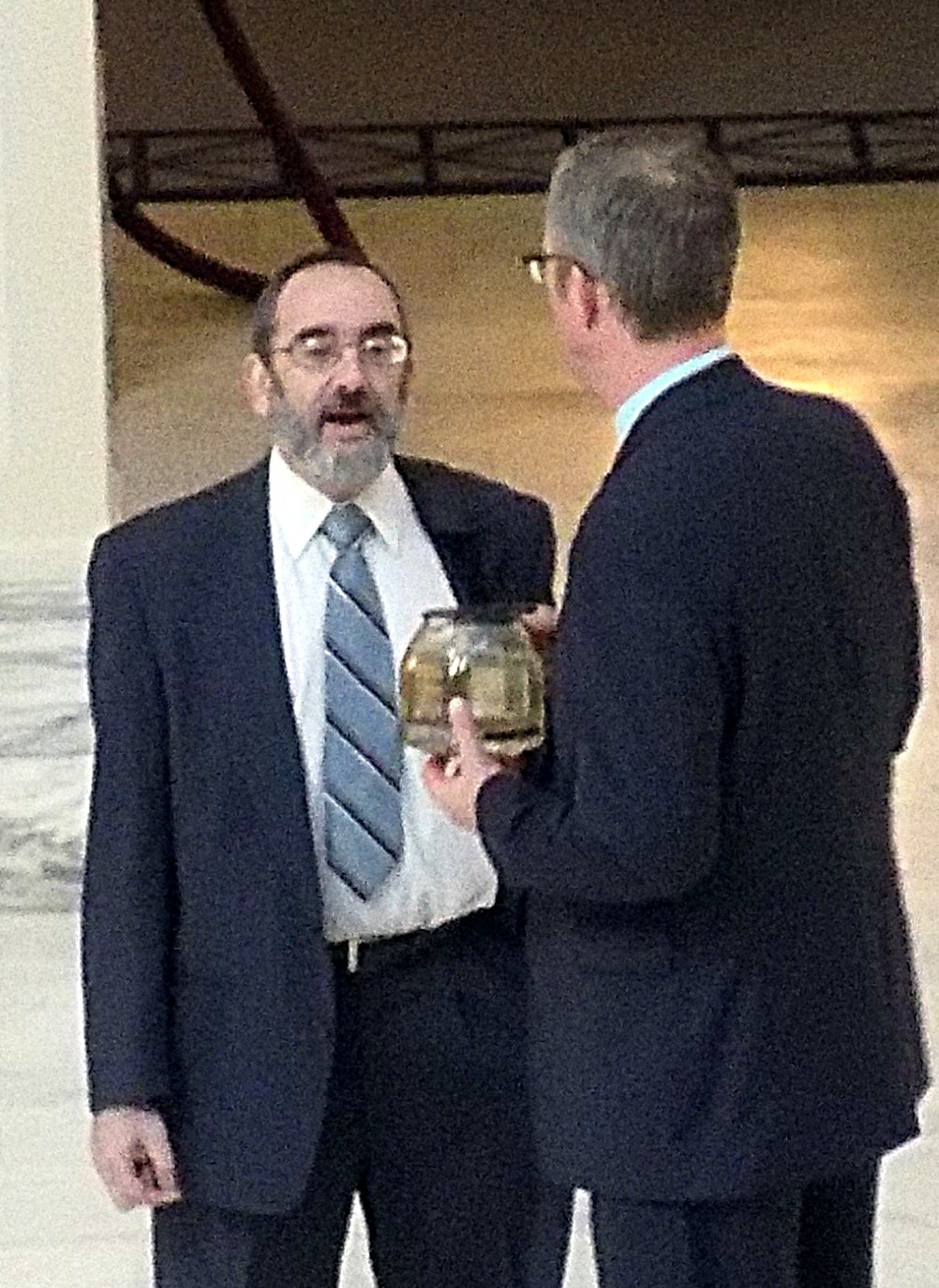By Jason Doyle Oden
The budget agreement between Governor Fallin, Senate President Pro Tem Brian Bingman and House Speaker Jeff Hickman makes up more than $969.3 million of the $1.3 billion budget gap.
The agreement keeps common education funding at the same level from the General Revenue Fund. The Oklahoma Healthcare Authority will get an additional $83.8 million to hold of major provider cuts. Department of Corrections will get the same level of funding, while the proposed budget will pay for the Department of Human Services Pinnacle Plan to improve the state’s foster care system.
Most state agencies will receive a cut of one to ten percent.
 “Thankfully, those worst-case scenarios can be averted by passing this budget,” said Fallin. “This agreement closes a sizeable portion of a monumental budget hole and prevents the dire, unacceptable outcomes so many Oklahomans have feared may happen this session. There are still reductions in this budget, and it requires more hard votes to pass, but it is certainly a workable budget even amid a major energy sector downturn that is creating difficulties all across Oklahoma. We worked hard to protect key core services – common education, health and human services, corrections, mental health services and the Oklahoma Health Care Authority – while keeping our eight-year transportation infrastructure plan intact.”
“Thankfully, those worst-case scenarios can be averted by passing this budget,” said Fallin. “This agreement closes a sizeable portion of a monumental budget hole and prevents the dire, unacceptable outcomes so many Oklahomans have feared may happen this session. There are still reductions in this budget, and it requires more hard votes to pass, but it is certainly a workable budget even amid a major energy sector downturn that is creating difficulties all across Oklahoma. We worked hard to protect key core services – common education, health and human services, corrections, mental health services and the Oklahoma Health Care Authority – while keeping our eight-year transportation infrastructure plan intact.”
More than $2 billion in revenue ideas were considered. Some of them made it into the agreement.
 “The absence of various revenue measures required deeper reductions to higher education and transportation in order to avoid truly unacceptable funding levels for K-12 schools and hospitals,” said Secretary of Finance, Administration and Information Technology Preston L. Doerflinger. “Transportation and higher education have superior financial positions compared to the rest of government and can absorb reductions far better than common education and health care could. In fact, transportation has said no projects will be significantly altered under this plan, and higher education has already implemented several cost-cutting measures in anticipation of reduced funding. These were difficult decisions, but they had to be made when faced with a challenge of this magnitude.”
“The absence of various revenue measures required deeper reductions to higher education and transportation in order to avoid truly unacceptable funding levels for K-12 schools and hospitals,” said Secretary of Finance, Administration and Information Technology Preston L. Doerflinger. “Transportation and higher education have superior financial positions compared to the rest of government and can absorb reductions far better than common education and health care could. In fact, transportation has said no projects will be significantly altered under this plan, and higher education has already implemented several cost-cutting measures in anticipation of reduced funding. These were difficult decisions, but they had to be made when faced with a challenge of this magnitude.”
Legislative leaders said while an agreement is in place, the challenge now is to pass the appropriate legislation before the constitutionally mandated end of session on Friday.
“For months, the public has been concerned about the possibility of four-day school weeks and mass closings at rural hospitals and nursing homes because of drastic budget cuts. The budget agreement is a practical solution that closes the shortfall while avoiding extreme cuts and worst-case scenarios in our schools, our hospitals and nursing homes,” said Bingman.
“This agreement fully reflects the House Republican priority to see that schools are protected, hospitals stay open and road projects stay on track. It is a balanced approach that reins in tax breaks, responsibly bonds long-term infrastructure and causes agencies to make the difficult spending reductions necessary in a historic oil bust. House members worked harder than ever this session to find conservative solutions to the greatest budget challenge of our generation and we have those solutions in this agreement. We committed months ago to leading our state out of this hole and now we must be committed to seeing this budget through to the finish line,” said Hickman.
State Superintendent Joy Hofmeister applauded the Legislative leadership and Governor Fallin for coming up with a solution which doesn’t cut common education severely.
 “We are deeply grateful that in the proposed budget, common education funding will be held flat next fiscal year. This was a herculean effort on the part of Gov. Fallin and legislative leadership – particularly President Pro Tempore Bingman, Speaker Hickman, Sen. Jolley, Rep. Sears, Sen. Halligan and Rep. Martin – one we realize means greater sacrifices and deeper cuts for other vital agencies. We know this has been a difficult session for lawmakers, and we greatly appreciate their commitment to making hard decisions and doing everything they can to protect our kids. This budget represents a best-case scenario as we plan for the next school year and continue to work together to maximize educational outcomes for Oklahoma schoolchildren,” Hofmeister said.
“We are deeply grateful that in the proposed budget, common education funding will be held flat next fiscal year. This was a herculean effort on the part of Gov. Fallin and legislative leadership – particularly President Pro Tempore Bingman, Speaker Hickman, Sen. Jolley, Rep. Sears, Sen. Halligan and Rep. Martin – one we realize means greater sacrifices and deeper cuts for other vital agencies. We know this has been a difficult session for lawmakers, and we greatly appreciate their commitment to making hard decisions and doing everything they can to protect our kids. This budget represents a best-case scenario as we plan for the next school year and continue to work together to maximize educational outcomes for Oklahoma schoolchildren,” Hofmeister said.
Americans For Prosperity – Oklahoma has been actively campaigning against tax increases and Medicaid expansion.
“We are extremely pleased that the House, Senate, and the Governor were able to come together and reach an agreement to resolve our budget shortfall without raising tax rates and without expanding Medicaid through Obamacare,” said AFP State Director John Tidwell. “AFP conducted an outreach initiative to hundreds of thousands of citizens across the state to oppose the OHCA’s “Rebalancing” plan to expand Medicaid, through volunteer grassroots efforts, as well radio, digital, and print media. As a result, thousands of Oklahomans reached out to their elected officials through letters, emails, and phone calls, to let them know that they opposed Obamacare’s Medicaid expansion and the tax increases proposed to pay for it.”
However, not everyone is on board with the budget agreement. The Oklahoma Policy Institute’s Executive Director David Blatt contends it cuts too much from other vital state agencies and services.
 ”The budget makes these dire cuts even though lawmakers have left hundreds of millions on the table by not stopping a reckless tax cut that was never supposed to happen in these conditions, using far less than the full available 3/8ths of the Rainy Day Fund, failing to increase the cigarette tax, and refusing available federal funds to save rural hospitals. The secretive process and last-minute unveiling of the budget has also already forced schools to lay off teachers and left vulnerable seniors and other Soonercare patients and providers facing months of extreme anxiety,” said Blatt. “Lawmakers should show the courage to reject this budget deal and come back with a better plan to address this emergency, even if it requires going into special session.”
”The budget makes these dire cuts even though lawmakers have left hundreds of millions on the table by not stopping a reckless tax cut that was never supposed to happen in these conditions, using far less than the full available 3/8ths of the Rainy Day Fund, failing to increase the cigarette tax, and refusing available federal funds to save rural hospitals. The secretive process and last-minute unveiling of the budget has also already forced schools to lay off teachers and left vulnerable seniors and other Soonercare patients and providers facing months of extreme anxiety,” said Blatt. “Lawmakers should show the courage to reject this budget deal and come back with a better plan to address this emergency, even if it requires going into special session.”
The Oklahoma Public Employees Association also calls on the Legislature to come up with another funding plan because of the cuts.
“This budget agreement is bad for Oklahomans who rely on services provided by DHS and other agencies,” says OPEA Executive Director Sterling Zearley. “The agreement is more about election year politics than serving Oklahomans. Leadership is saying they protected services but significant cuts will still be implemented because agencies are underfunded. We need lawmakers to stand up and vote no on this budget.”
The House Joint Committee on Appropriations and Budget took the first step Tuesday night and passed the appropriations bill.


